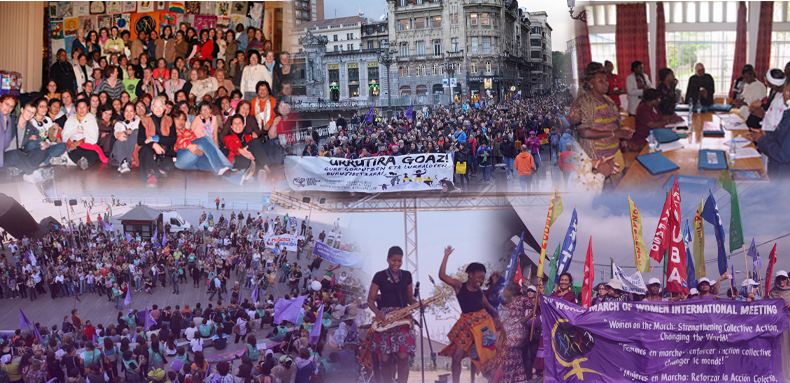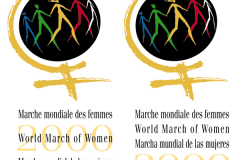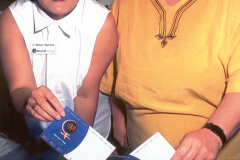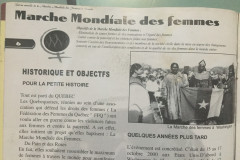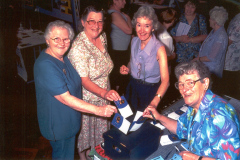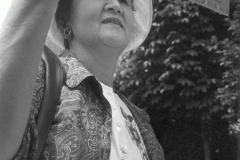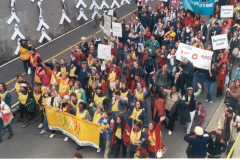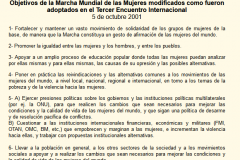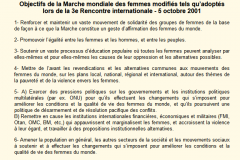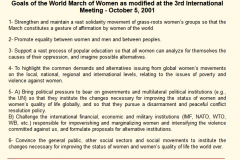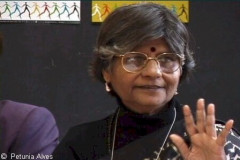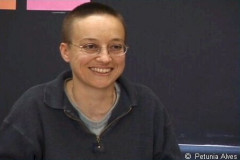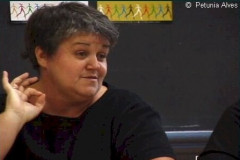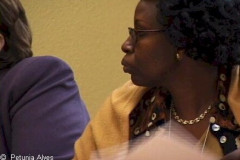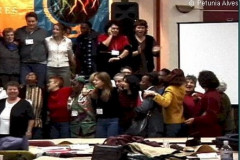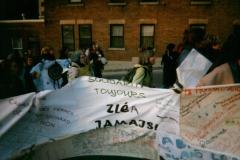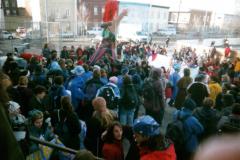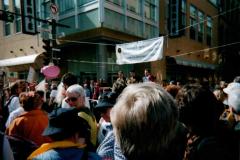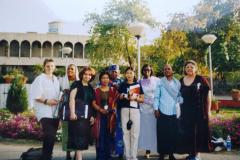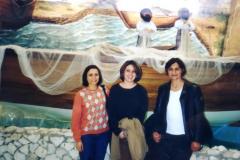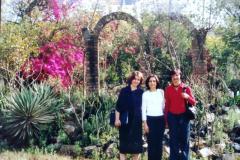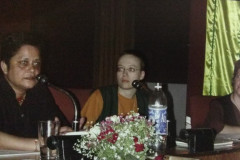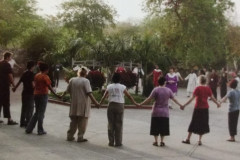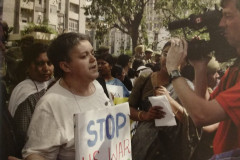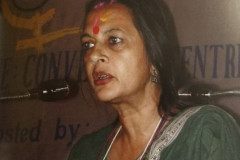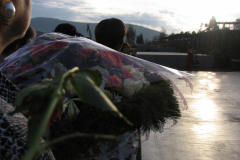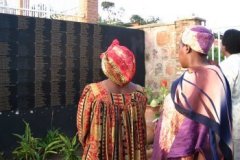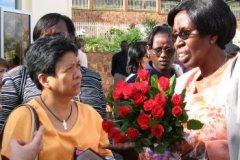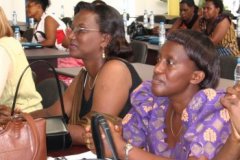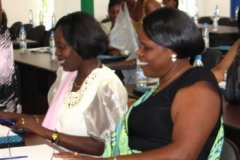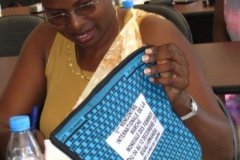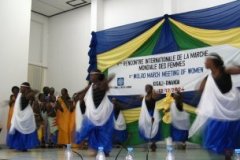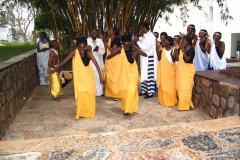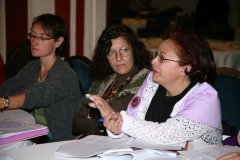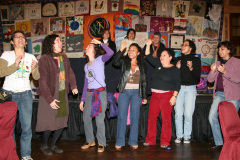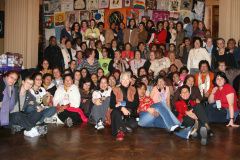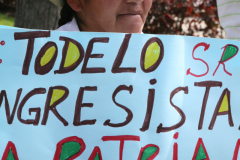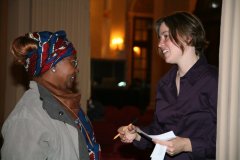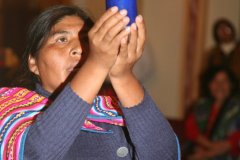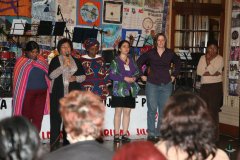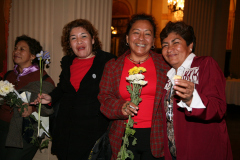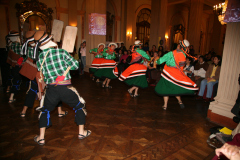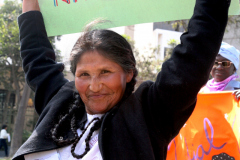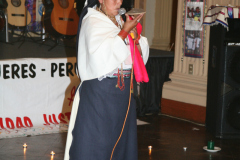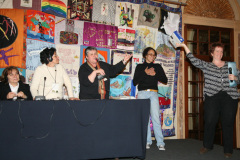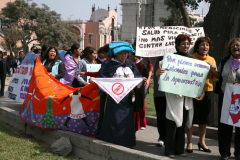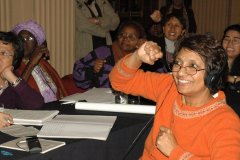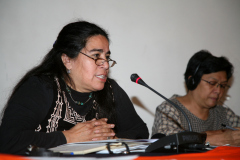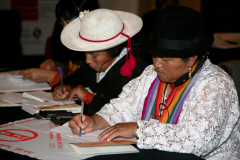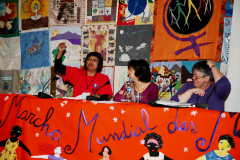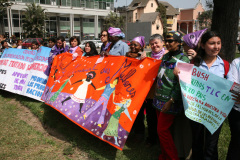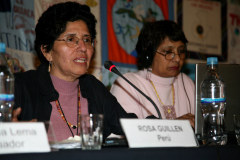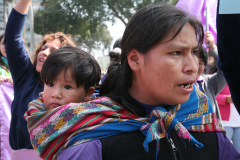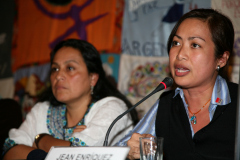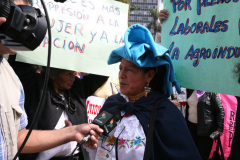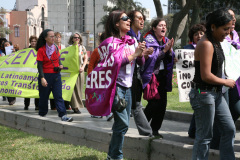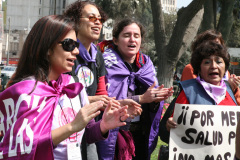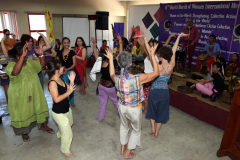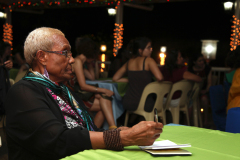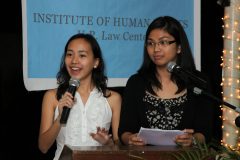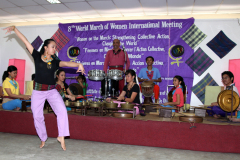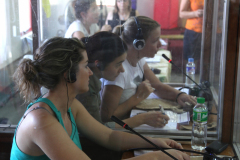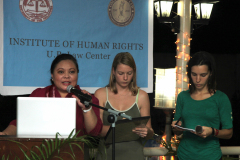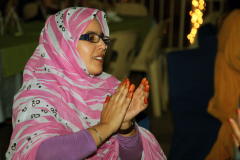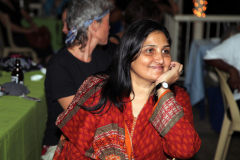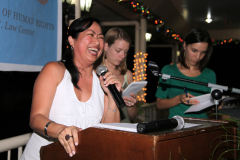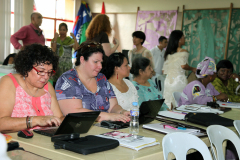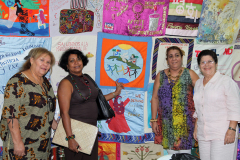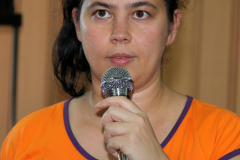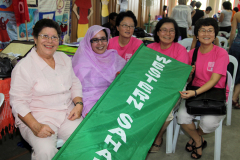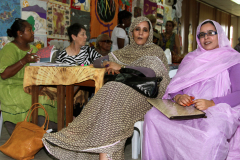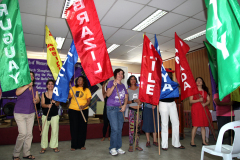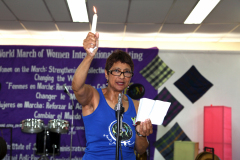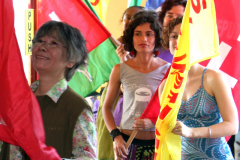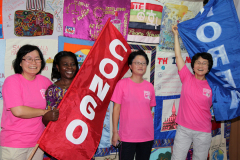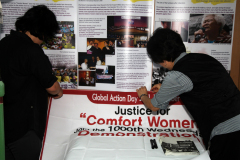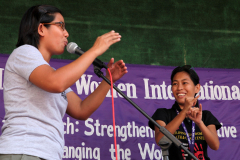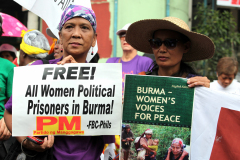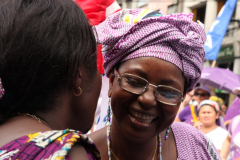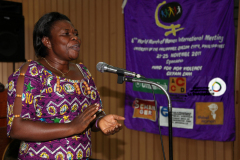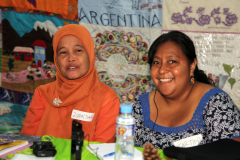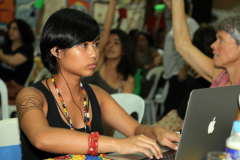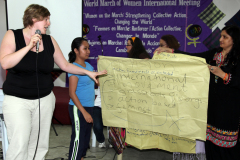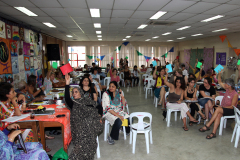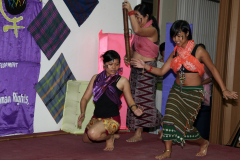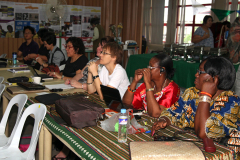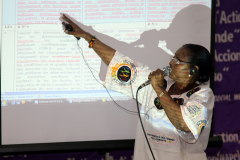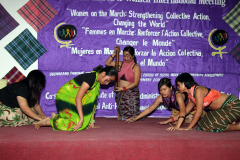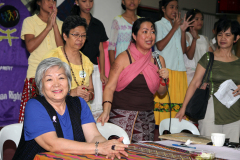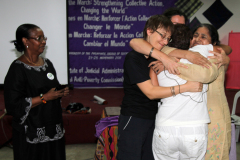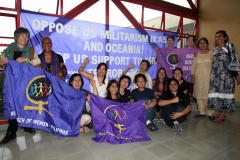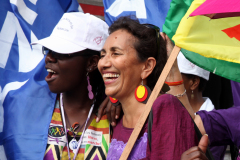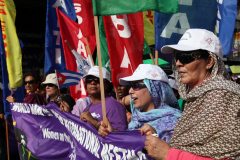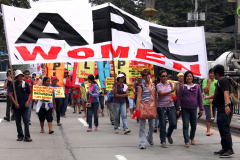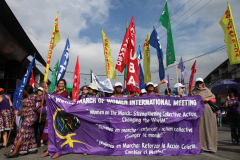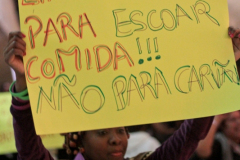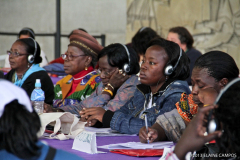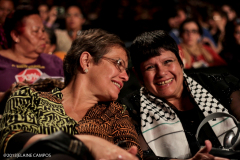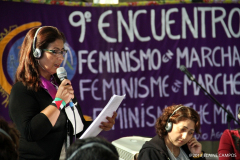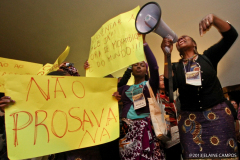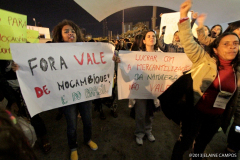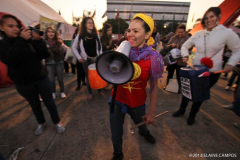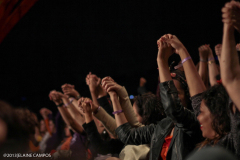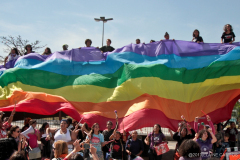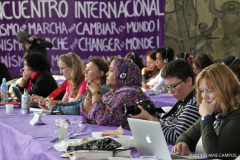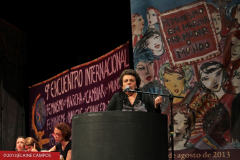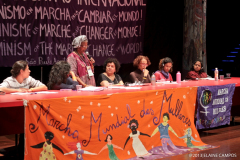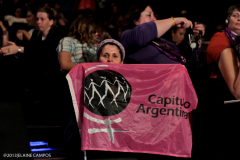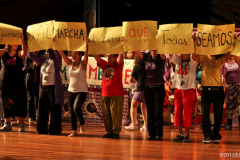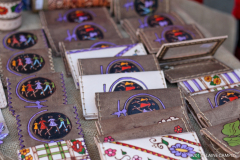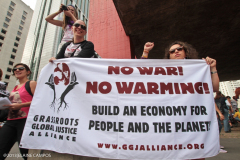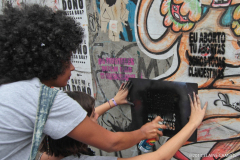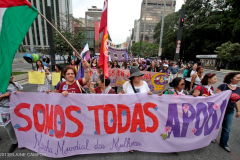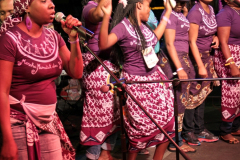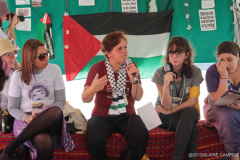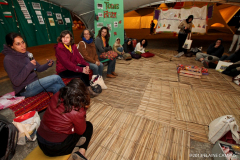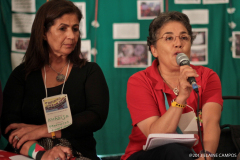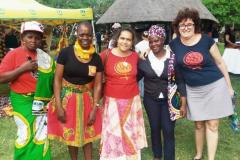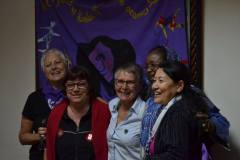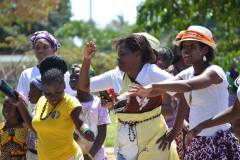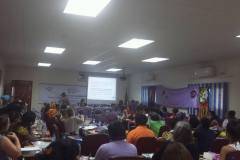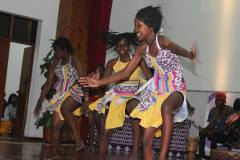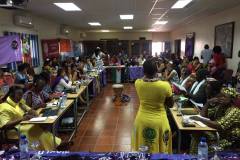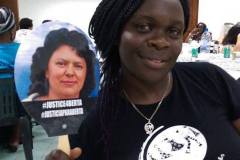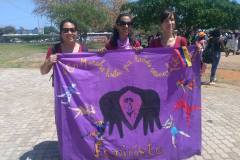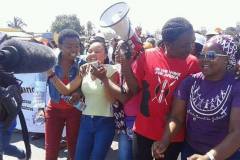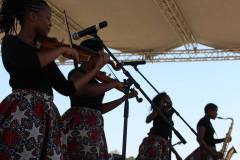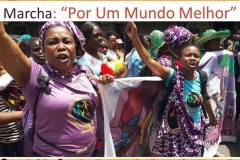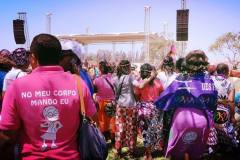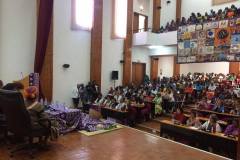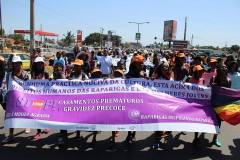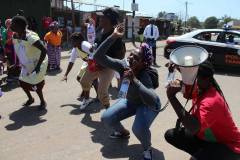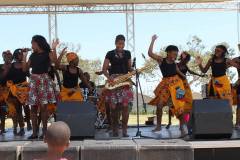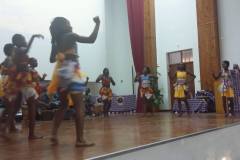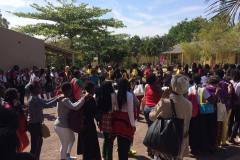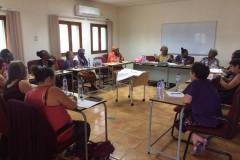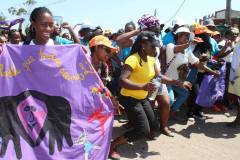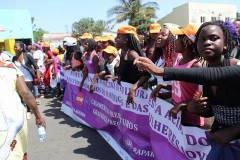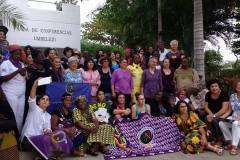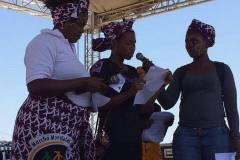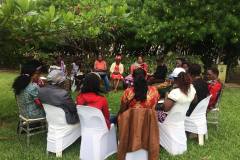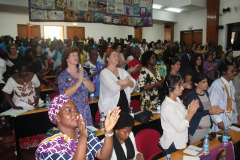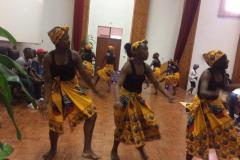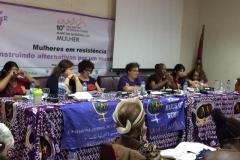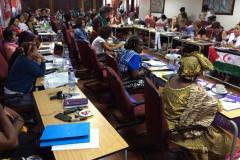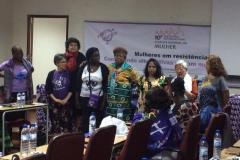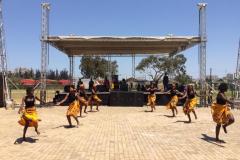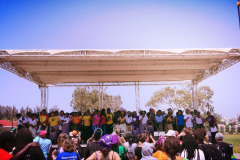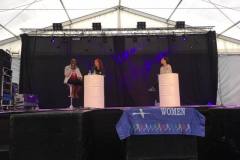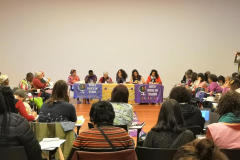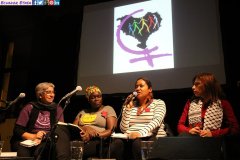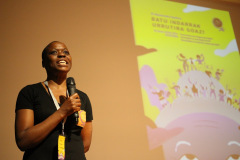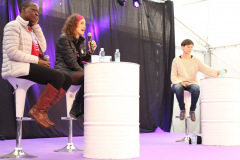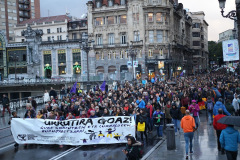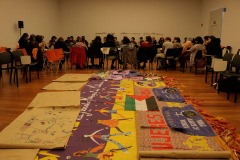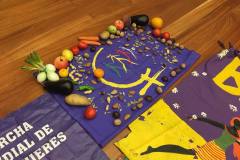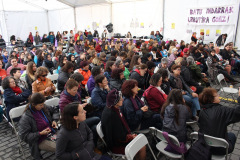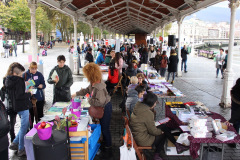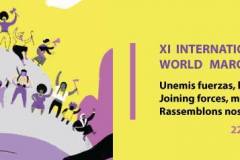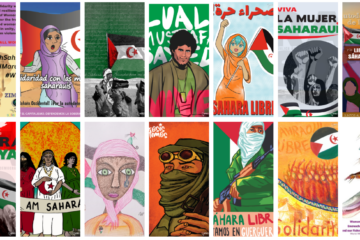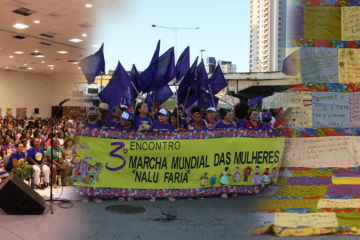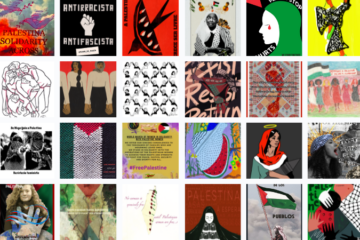The World March of Women is a feminist, anticapitalist, and anti-racist movement organized in dozens of countries around the world. Its actions in the territories are actions of resistance to the capital-life conflict and construction of self-organization and supportive alternatives for social transformation.
In this October 2021, the World March of Women organizes its 12th International Meeting, held for the first time on an on-line platform. The International Meetings are crucial spaces for exchange between different regions, update of political discussions, and construction of a common view on feminism and struggle and organization strategies.
The International Meetings have been held since 1998, when the alliances to form the March were only beginning. Such meetings have been held in ten different places, up to now: Quebec, United States, India, Rwanda, Peru, Galicia, Philippines, Brazil, Mozambique and the Basque Country. In each of them, the international delegations also had the opportunity to learn more – and more closely – about the local realities and organized struggles, returning to their territories with new knowledge and inspiration.
Organizing an international women’s movement requires many hands and a full anti-systemic policy that challenges imperialism, made by and for all women, respecting their diversity. When women get together, listen to one another, and create one single movement, they subvert the inequality-based logics, in which ““the international movement should be confined to expressions of solidarity by those women who had achieved their agenda with those who had not yet managed to do so. This is a rationale that we question. We note that such achievements, especially in the so-called developed countries of the geopolitical North, did not apply to all women and men. There is a ‘South’ within the North, where new ways of denying the political rights of the poor and minorities have been found”[1].
We share in this gallery pictures and experiences offered by militants on all International Meetings held up to now. They allow us to learn about the steps and paths collectively taken and envisage all work, creativity, and persistence that make the World March of Women an irreversible movement, crucial to the anti-capitalist feminism. We hope to contribute to the collective memory of the feminist movement and inspire the sisters and comrades who, over the next days, will participate in the 12th International Meeting of the World March of Women.
.

With the motto “We march against poverty and for wealth distribution. Against violence to women and for respect to their physical and mental integrity”, more than one hundred women met in Montreal for this preparatory course for the launch of the World March of Women in 2000. They defined the movement goals, purposes, and values.
In their final statement, they honored feminist leaderships and “millions of women who work anonymously to defend and promote women’s rights”, in addition to all those who suffer with violence around the world. They stated their solidarity with the peoples in struggle and undertook to “continuing the struggle, each in her own country, to break the silence of all those women who have died in anonymity”.
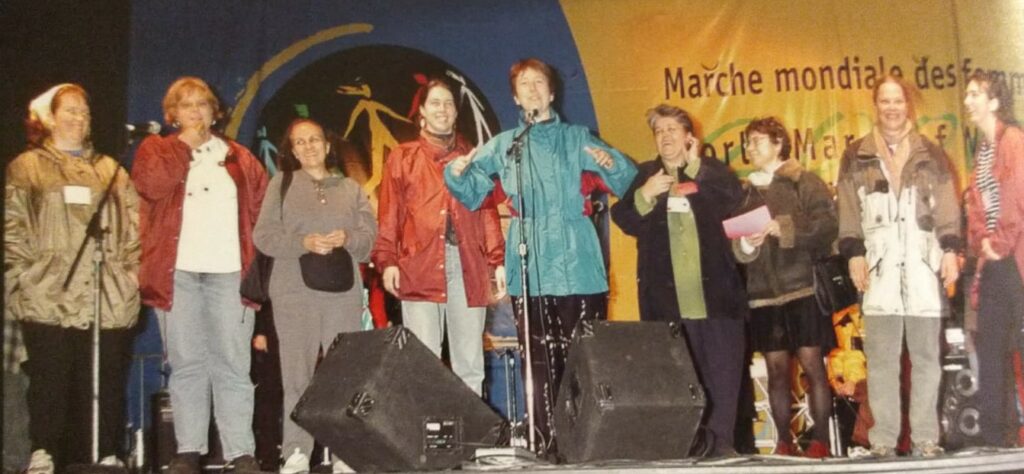
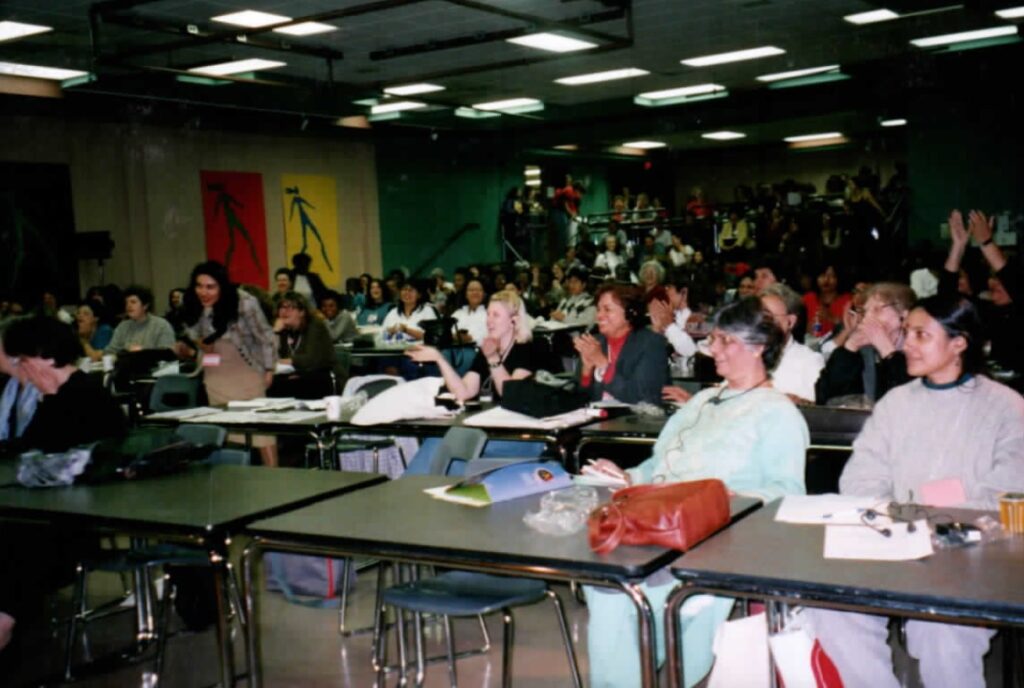
“After months of working day and night to bring women from around the globe together in Montréal, Québec, over 100 delegates from all corners of the planet (and almost as many volunteers from Québec) came together to meet for the first time. We succeeded in bringing together a wonderfully diverse group of women (some of whom were traveling abroad for the first time) from grassroots organizations, speaking different languages and from different political and cultural backgrounds. Not only we succeed (imperfectly) in adopting the 17 world demands as well as the world actions for 2000, and electing the first International Liaison Committee, but we did so during a meeting that only lasted two days, with women who had never met before!” Nancy Burrows
“In October 1998, in Montreal, women agreed to participate in this crazy idea of uniting the feminist movements in one struggle against poverty and violence to women. Such moment will be engraved in my memory for a long time. We’ve learned to navigate beyond our different experiences and our different analyses. We’ve learned to listen to one another and talk about our hopes and demands. It has been a great challenge, but the conviction that this was an essential movement, the proud of being women, feminists, and committed has dominated us as from the first joint action.” Diane Matte

“Two Moroccan militants representing the Moroccan Union Labor [Union Marocaine du Travail – UMT] and the Women’s Action Union (Union de l’Action Féminine – UAF), were at the meeting in Montreal in October 1998. They undertook to organize the WMW in Morocco. In our first meeting, at the UAF headquarters, in January 1999, we were less than ten women. Over the year, we met to prepare the 2000 march. On March 12, 2000, we were hundreds of thousands of women marching on the streets of Rabat, voicing the claims we prepared together. It was an unforgettable moment.” Khadija Ryadi
.

The 2nd International Meeting united the space of political organization of the movement and a busy agenda of political denouncement and claim actions that concluded the WMW first international action.
The World March of Women wrote a report on it in the book 1998-2008: A decade of International Feminist Struggle: “The previous day, October 17, International Day for the Eradication of Poverty, simultaneous marches had taken place in 40 countries. In a symbolic act in front of United Nations headquarters, the marchers presented more than five million signatures gathered in support of the demands made by women at the community level to confront poverty and violence. Two days earlier, on October 16, an international delegation had meetings at the World Bank and the International Monetary Fund, and denounced the devastating impact of these institutions’ policies on women’s lives. Those were times of one way of thinking, when neoliberalism was strongly hegemonic, when there seemed to be no way out. It was then that we raised our voices and decided to go beyond the possible or the imaginable. Thus we gave birth to our 2000 platform of international demands”.
“After the success of the national actions across the globe and the international actions in the streets of Washington and New York, presenting our world demands to the President of the World Bank, the General Director of the International Monetary Fund and the General Assembly of the United Nations, it became clear and official, with enthusiasm and determination, that what was initially launched as a one-time project in the year 2000 had become a permanent and irreversible movement!” Nancy Burrows

“I remember the year of 2000 when I and Shashi Ji attended an international meeting to organize World March of Women events around the world. By that time, 80 organizations had registered for the WMW campaign in India and we did numerous programs.” Neelam Chatuverdi

“Our representatives in the march in New York, on October 17, 2000, continued our march in the other side of the Atlantic Ocean and represented us in that meeting, which was also a historic moment for the global militant feminism.” Khadija Ryadi

“The group of women public servants of Cameroon [Groupement des Femmes Employées des Collectivités Publiques Locales du Cameroun (GFECOP)] was in the march in October 2000 in the United States: on the 15th in Washington and on the 17th in New York. We carried out awareness and mobilization actions with the slogan “2000 reasons to march”. In Cameroon, the government spares no efforts to improve women’s conditions, but conflicting relationships persist in our society, which restrains women’s full development. GFECOP’s initiatives have never been parted from the purposes of the World March of Women: the march for peace, women’s economic development, democracy, safety, fair trade, and the struggle against HIV/AIDS, in addition to Covid-19.” Jacqueline Élisabeth Mbocksi
.

After the intensive activities in 2000, women met once more in Montreal, with the motto “Another step forward in the struggle to end poverty and violence against women”. Such was an important follow-up moment to organize as a permanent international feminist movement in a context of transformation: soon after the September 11th attacks, women warned the world about the atrocities committed by imperialism in the name of peace.
“Still in shock from the September 11th, 2001 attacks in the US, which had occurred only weeks earlier, and the fears of the repercussions, retaliation and increased militarisation that would ensue, international delegates travelled from around the world (in spite of their fear and travel restrictions) to meet in Montréal to continue to build and structure the international movement of the World March of Women. A powerful declaration for peace around the world was adopted, new committees and a structure to ensure shared international leadership were adopted, including a voting mechanism by consensus, as well as the WMW goals.” Nancy Burrows
.

With the motto “World March of Women: An Irreversible Movement”, sisters and comrades met at the Scholar’s House university campus for their first International Meeting outside North America, in an effort to widen internationalism with diversified leaderships. The Meeting established a common agenda and discussed the organization of the National Coordinating Bodies based on a previous questionnaire. A document containing decisions was prepared and a statement on the values of the WMW was approved.
“We also organized a meeting in Jamia Millia, Delhi, in which 65 people from 26 organizations participated. People was impressed by the speech given by Nancy and took a commitment to take this movement forward. We performed numerous rallies in the states of Uttar Pradesh, Madhya Pradesh, Bihar, Bengal, Rajasthan, organizing meetings, workshops, seminars, honored those who had done very good work in Uttar Pradesh in this direction. We feel that to end poverty and women’s violence in India and around the world, we have to come together on a global movement.” Neelam Chatuverdi

“The International Committee and Working Groups were created and the WMW Declaration of Values was adopted, recognizing and naming the diversity of the women of the March working together to “build another world”. One of the highlights of this meeting for me was the presentation of the WMW International Lesbian Rights Committee and, in particular, the first-hand testimony of an Indian lesbian rights activist sharing her experiences of political struggle in a context of oppression and forced clandestinity. Another memorable moment was the march and demonstration held in the streets of Delhi.” Nancy Burrows

The action in Kigali was the first International Meeting organized in an African continent. With the motto “Vision Leading to Action: Countering Poverty and Violence against Women”, this meeting structured the WMW 2nd International Action and approved the Women’s Global Charter for Humanity, compiled with contributions from all grassroots group members of the March. The Charter circled the globe, weaving a Solidarity Quilt from one country to another, with patches that expressed women’s struggles around the world.
The Meeting report contains the contribution of Awa Ouedraogo, a militant from Burkina Faso who died in July 2021. She “expressed the WMW’s condolences for the genocide tragedy and asked participants to observe a minute’s silence in memory of the victims”.

“It was an occasion to see and learn firsthand about the incredible experiences of feminists in the African Great Lakes Region (Rwanda, Democratic Republic of Congo, Burundi) who had been working together towards building bridges for peace, across political and ethnic divides. A wide variety of intense emotions were palpable at the meeting, both during debates in the plenary, informal discussions and also during the visit to the Memorial Museum Against Genocide.” Nancy Burrows

“The Global Charter was discussed at the national level and empowered sisters from 25 states who signed their strong commitment to eliminate poverty and violence against women on a 5 meter canvas, which was later presented to the president of India, K.R. Narayanan, and exhibited in Quebec.” Neelam Chatuverdi

“The 5th International Meeting was decisive for recognition of lesbians’ rights, a matter that had been dividing us since the 1st International Meeting. A representative from Senegal asked me to organize an informal meeting. Many accepted the invitation, among whom there were some lesbians. What does it mean to be lesbian? The questions emerged… We respectfully listened to those who shared their experiences. This meeting was memorable to all participants. For the first time we approached a subject from the experience perspective, and not from the claims perspective. Other women, later, told us their intimate histories, such as an illegal abortion.” Michèle Asselin
.

In 2006, with the motto “Change Women’s Lives, Change the World”, the fields of action of the World March of Women emerged, inspired by women’s local struggles. Such fields of action guided a three-year strategic plan, defined there, as well as the actions of the movement over the following years: common assets, food sovereignty, and access to resources and biodiversity; peace and demilitarization; women’s labor and economic autonomy; violence against women as a tool for women’s body, life, and sexuality control. In this meeting, women for the first time transferred the International Secretariat to a Southern country, and Brazil was elected.

“In March 2003, the Peruvian delegation took on the challenge of organizing the 6th International Meeting in 2006. These were times of great challenges for us. We were committed to the struggles for the recovery of democracy and the trial of dictator Fujimori, and more specifically, we were in the process of organizing with women from various grassroots spaces and building alliances with mixed organizations that resisted the FTAA (Free Trade Area of the Americas) promoted by neoliberal corporations and governments led by the United States. By 2006, the FTAA had been defeated in Argentina, but the US and the governments of Peru and Colombia continued to negotiate free trade agreements. Our long-awaited Meeting took place in July 2006, in the middle of two great mobilizations: the comrades of the popular kitchens and of the Glass of Milk (Vaso de Leche) demanding the right to food for impoverished people, and the lesbian and gay movement celebrating its existence and demanding rights. Both passed through our space, received our international greeting, and were moved by our diversity and commitment.” Rosa Guillén

“I remember confidently ‘passing the baton’ symbolically, handing over the hard drive with the WMW archives from 1998 onwards to the team of the Brazilian March who would carry the flame of coordinating the March internationally. I fondly carry with me today the spirit of the March and so many memories of debating, working, laughing, crying, singing and celebrating with my comrades, fellow activists and friends from the World March of Women.” Nancy Burrows

“Peruvian women’s experience really impressed us. One day, next to the place where the Meeting was being held, there was a march of women involved in the ‘Glass of Milk’ (Vaso de Leche) initiatives against free trade. The movement wanted to learn from the political culture of a Southern country. One thing that encouraged election of Brazil for transfer of the International Secretariat was the fact that we were organized across the country and counted on listening and welcoming capacity. In addition, we already had the internationalist experience because we coordinated the WMW Collective of Alliances and Internationalization and we were involved both in construction of the World Social Forum and in the Social Movements Assembly, within the Forum.” Miriam Nobre
.

During eight days of activities, participants went through intense education and working plan definition journeys towards the 3rd International Action, which would be held in 2010. They also discussed the organization in regions and construction of alliances, which gained strength specially during the Nyéleni Forum for Food Sovereignty, held in 2007 in Mali. Food sovereignty and common assets were at the center of discussions in this Meeting. Participants also made a demonstration in Vigo, and then built a sculpture (Milladoiro) with stones from their countries.

“The first International Meeting held in Europe was in Vigo/Galicia in 2008. Its distinctive feature had been various activities and actions surrounding the International Meeting such as cultural manifestations, traditional rituals, Forum and Fair on Food Sovereignty, massive actions. In this International Meeting we had decided to base our 3rd Global Action on four pillars: violence against women, peace and demilitarization, economic autonomy and public goods. We had also been affected by the violence against women in Democratic Republic of Cong. At the end of the IM, before leaving Vigo those who were involved in the WSF had a small meeting and orientation on the next WSF and soon after we would come together again in Belem in 2009.” Yıldız Temürtürkan

“It was my first meeting as a member of the International Secretariat, in charge of communication. In there we defined the 3rd International Action, its format and its closure which would be in Congo. We strengthened our view on militarization as a strategy of capital accumulation to get out of the crisis – it was the beginning of the 2008 crisis. We made a public statement that we women were not going to pay for the crisis. We identified mechanisms of cutting public services, and massive unemployment that was sending women home. The ‘clog action’, which we did in the street, was also very cool.” Alessandra Ceregatti

“My feeling was that the five values of the March were being put into action. For me it was a moment of knowledge, of putting a face to each one’s voice and emails, of feeling all the collective power of this group of women reflecting and building together in the plenary sessions and in the street. We had a very big march. We had a food sovereignty fair and a public forum. We put those values into action in this way and also in the relationship with each other, in the care, in the interpretation, in the accompaniment, in the guarantee of participation.” Celia Alldridge
.

The 8th Meeting was an important assessment of the 3rd International Action and a collective analysis of challenges for the following period. In addition to outlining the general scope of the three following years, the purpose of the Meeting was to strengthen the organization on a regional level and stimulate formulation of regional working plans. In a video recorded during the Meeting, the militant of the World March of Women from Philippines, Jean Enríquez, stated how she viewed feminism:
“Feminism is a world view, a way of thinking and a way of life. It means action and movement and the elements of it includes a very critical understanding of the world. The patriarchy is one of the structural problems that we are facing and it’s the foundation of huge issues. It’s intersecting with other structural issues like capitalism and racism and other forms of hierarchies. To be a feminist takes on a world view and to sustain actions that challenges all forms of hierarchies and economical inequalities.”

“This was the last meeting I attended as an IC member. There were four of us “retiring”: Wilhelmina, Saleha, Teresa and I. It was very emotional to say goodbye after having worked together for many years. This was one of my favourite meetings, because we were discussing the vision for the second decade of the March and there were so many young women present as delegates and among the workers and observers, and also marching in the street with us. It was a meeting with a lot of cultural sharing, dancing, singing and laughter. The energy was very special!” Mich Spieler

“I remember the debate we had on prostitution and the denunciation of how capital uses Asian women for exploitation. I also remember the power of mobilization of a big march that we did during the Meeting, which I realized had a very big support from the local left movements. And I also remember that in the Philippines there were many varieties of corn!” Conceição Dantas
.

The Meeting took place at the Latin America Memorial, in São Paulo, bringing together 1500 women from Brazil and the world. Themed “Feminism marching to change the world,” the Meeting had an intense programme, with activities open to many participants and meetings with international delegates. Every night, international and Brazilian women would meet under the Solidarity Tent. The Meeting promoted internationalism, solidarity, cultural expressions, and examples of struggle, and it closed with a huge demonstration on the streets of the city.

“I’ll highlight the international solidarity expressed through the tent ‘We Are All Apodi.’ This tent symbolized how the struggle spearheaded by women in defense of territories is a struggle for all, not only for locals. It’s also a display of how our actions connect local and global.” Rejane Medeiros

“The 9th Meeting was my first experience at an international event hosted by the WMW outside my country, after I attended Rio+20, which was virtually the place where I first spoke in front of big crowds. It was at the 9th Meeting that Mozambique took over as coordinators of the International Secretariat. It was a moment of awakening for the magnitude of what we are as an international, feminist movement that encompasses extreme diversity and the most varied forms of expression. The message that Miriam Nobre left us with really stayed with me: our strength is in our ability to acknowledge that some go first, others come right behind them, but we make sure to walk together so that no one is left out. That statement reminded me of the African proverb, ‘if you want to go fast, go alone; if you want to go far, go together.’” Graça Samo

“The Meeting was the result of a lot of hard work to make sure all militants would be able to come, to make political arrangements, to organize it financially, to carefully make sure the programme would cater to militants from the countryside, the forests, the outskirts, and the academy. Women from Palestine told us what it’s like to live in countries occupied by the US military. Guatemalan, Filipina, US, Peruvian, Brazilian, Cuban women and others could talk and listen to each other, strengthening anti-capitalist feminism and solidifying global solidarity. The feminist and solidarity economy fair, art and cultural expressions, and the camaraderie fueled a desire for transformation, which poured over the walls of the Latin America Memorial and the capitalist borders.” Maria Fernanda Marcelino

“This was the first International Meeting I attended as a worker and not as a delegate. I had helped the International Secretariat prepare and was working on the communications team to report on the meeting and activities around it every day. It was an exciting learning experience in building alternative communications. The most memorable part of this meeting though was the evolution in the discussion of lesbian, queer and trans rights. We – delegates, observers, workers – started having discussions late at night at the hotel in the lobby. We were tired of having to always find times to meet outside the official proceedings and it was such a powerful and important moment when lesbian, queer and trans realities made it on the agenda of the main meeting. Lesbian, queer, non-binary, trans folks have always been marching in the World March of Women, and this was a key moment in making this reality visible.” Mich Spieler
.

The International Meeting in Maputo was the first meeting after the Mozambique National Coordinating Body took over the International Secretariat, and the second meeting held in Africa.
In an extract from the statement of this Meeting, the women said: “We claim our rights to regain control of our bodies, our lands and our territories. Despite this chaotic world, we believe that another world is possible! Together we work building our feminist alternatives, strengthening our movement…”

“The Meeting had a very interesting panel, which we called ‘How the WMW experiences diversity,’ bringing together the voices of a lesbian woman, a woman with visual impairment, and a young woman. It was so interesting to listen to these women talking about their challenges as they experience oppression through discrimination, and how the WMW, as it builds grassroots feminism, can struggle for a political project building political actors.” Graça Samo
.

“Batu Indarrak, Urrutira Goaz (Let us join forces, we will go further), let us build sovereignty over our bodies and territories” was the motto of the latest Meeting, a space for exchange and city occupation, as well as for defining goals and a political strategy for the 5th International Action, held in 2020. Delegates from 36 countries and territories saw, at that moment, “a reorganization of the capitalist system that results on a resurgence of fascism, an increase of war conflicts, and a loss of social and economic rights,” as stated in the final declaration of the Meeting.
We reaffirm women’s self-organization as our strengthening strategy as political subjects that are building a worldwide movement, in alliance with movements that share with us the commitment of transforming the world and ensure people’s right to self-determination and the right to resist.
(Final declaration)
“I was really moved by women’s local coordination and organization ability. We awakened for the challenges of organizing a shared themed agenda considering the differences in local and regional realities in such a troubled international context. ‘We resist to live, we march to transform’ was our chosen slogan for the 5th International Action! And it was in Bilbao that we kick-started the International Feminist Organizing School, in partnership with allied organizations, a journey that is being build and keeps moving forward!” Graça Samo

“To receive nearly a hundred international delegates and allies meant displaying the diversity of the feminist struggle of the March, which, once again, ratified itself as a feminist, anti-capitalist, anti-patriarchal, anti-colonialist, and anti-racist movement. This has detached us from a liberal feminist that is gaining momentum. We thought that one of the most important agreements of this meeting was choosing borders, migrations, and transnational corporations as topics of the 5th Action, to expose the violence against territories and the racist attacks against the lives of people who migrate. Within the Meeting, we organized ‘Feministon Herria,’ which we translated as “Feminist People.” We occupied the streets to share the local resistance that feminist collectives of the Basque Country build and the international struggles of the World March of Women.” Luciana Alfaro Lavado
[1] World March of Women. 1998-2008: A Decade of International Feminist Struggle. São Paulo, 2008.
The photos were taken by Joane McDermott, Elaine Campos, Dalila Macuacua, Celia Alldridge, Nzira Deus, Petunia Alves among others, and found on World March of Women’s archive.

